 |
| |
The first reviews for "Quantum of Solace" are
out following the press screening in London on Friday
evening... |
|
First Press Reviews
17th October 2008
|
The first press screening of the 22nd
James Bond film "Quantum
of Solace" was held
in London on Friday 17th October 2008 at the Odeon in London.
Journalists from major media outlets were there to get
the first impressions of Daniel
Craig's second outing as
007, directed by Marc
Forster. Overall, the reviews are positive but note
that it is heavy on action and does not quite live up to
"Casino Royale" (2006). Many cite the performances from Daniel
Craig (007) and Dame Judi Dench (M) as the
highlights of the movie.
Review Round-Up
|
|
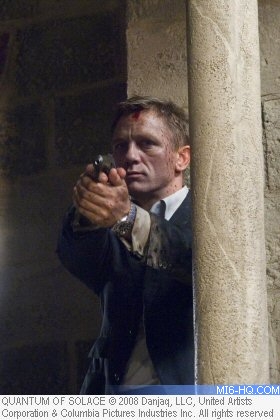
|
BBC News
This is a Bond adventure that's badder, better
but not bigger. Clocking in at one and three-quarter hours, it's
a good half hour shorter than 007's previous outing. And its
reduced running
time results in a leaner, tauter experience. Picking up shortly
after the end of Casino Royale when Bond confronted the mysterious
Mr White, Quantum of Solace quickly
throws him into a round-the-globe hunt. Bond is trying to track
down the shadowy organization whom he holds responsible for the
death of Vesper - the woman he loved
and who died at the end of the last movie. And that leads him to
sinister bad guy Dominic Greene, played by Mathieu Amalric.
So far, so familiar. But what this film does
differently is to focus closely on an emotionally battered Bond,
his mission and his motivation. There are odd moments of uncertainty
when the film tries to juggle Bond's personal story with the
ambitious plans being pursued
by Greene. But for the
most part the villainy rightly takes a back seat to Bond's emotional
journey. 007's mission may be what drives the film's plot, but
the real interest lies in how Bond deals with the individuals
and
situations
he meets along the way. That's not to say that the film jettisons
all the things that have characterized the previous stories. There
are broad nods to Goldfinger especially, but this film manages
the difficult task of moving the franchise into interesting
new areas. The raw nature of the film may put off some who yearn
for the days of gizmos, gadgets and Bond quips as he dispenses
with faceless
opponents.
And it's a brave step to push even further a
lot of the themes developed in Casino Royale, especially the
rediscovery of who Bond is, and why he is the way he is. It's a
film that feels like the second part of a trilogy, with this
being the bleaker second act. For a lot of the movie Bond
is a particularly unsympathetic character, and often it's only
Craig's performance along with
the shifting morality of Bond's legion of enemies that forces
the audience to root for him. Olga Kurylenko, who plays a refreshingly
different kind of female companion, does well with a part that
has far more depth than
most Bond girls. And Gemma Arterton is superb in her brief role
as an agent whom Bond encounters in Bolivia, cementing her position
as one of
cinema's brightest young stars. As ever the end credits promise
that James Bond will return, and thanks to Quantum of Solace,
the sense of anticipation for
this should be particularly high. Not to see what super villain
Bond will be battling, but to discover what the next stage will
be in a character that Daniel
Craig has managed to reinvent and develop movie by movie.
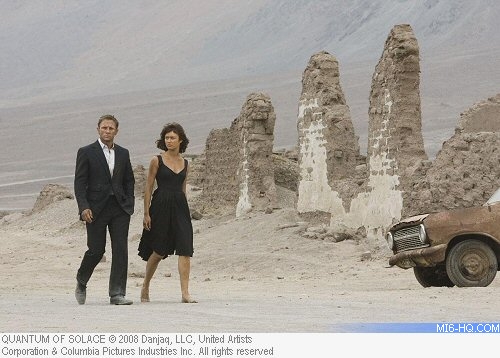 |
Times Online
James Bond is back, and this time it’s mighty personal.
Daniel Craig’s craggy agent picks up exactly where he left
off in another bruising thriller that leaves you feeling both
drained and exhilarated. There are hand-to-hand fights that make
your eyes water and old-school stunts involving motorbikes, speedboats,
jet fighters
and expensive cars that give you whiplash just looking at them.
Really, nobody does it better than the new 007.
Needless to say the plot is as forbidding as the title. A link
to a bank account in Haiti puts Bond on the scent of Mathieu
Amalric’s chief creep and ruthless businessman, Dominic
Greene. All great Bond adversaries are generously blessed with
kinks and quirks and Greene is no different. Amalric has a wonderfully
wormy arrogance. His sidekick, Elvis (Anatole Taubman), sports
a monkish fringe, and Tarantino bad looks. But it’s the
manner in which Amalric manages to poison all trust in Bond,
even from
his nearest and
dearest, that makes him one of the classic arch-adversaries. Cold
rage threatens to derail Bond’s mission to crack
Greene’s dastardly organisation known as Quantum, and I
doubt that there’s a better actor at bottling rage than
Daniel Craig.
The deadpan humour is still there. And despite the occasional
blasts of visceral and grisly violence, Craig is threatening
to become the most popular 007 yet, certainly with the younger
generation. Even the famous Bond babes seem to be getting tougher.
Olga Kurylenko’s stunning, hard-as-nails beauty, Camille,
has her own private vendetta that she wants to bring to a bloody
conclusion, with or without Bond’s help. And Gemma Arterton’s
effortlessly foxy Agent Field appeals to the better side of the
wounded anti-romantic.
The director, Marc Forster, has absorbed the lucrative lessons
discovered in Martin Campbell’s Casino Royale. He has also
managed to pace his sequel much better. Royale felt slightly
wheel-clamped by one too many longeurs. If anything, the crunching
chase sequences in Quantum of Solace are even more magnificently
dangerous. And the daredevil leaps and tumbles through glass
roofs are just as sensational as the splintering high-speed pyrotechnics.
But it’s the amount of heartache and punishment that Craig’s
new Bond absorbs that makes him look so right for our times. Bond
is no longer a work in progress. He is now the cruel, finished
article.
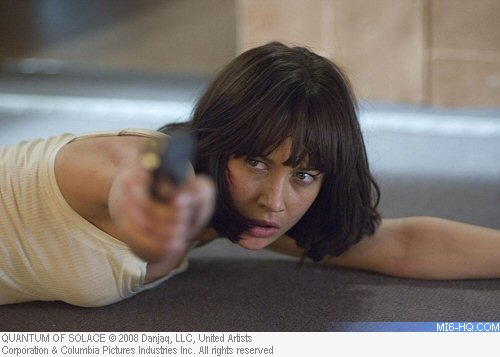 |
The Independent
Frenetic, full of chase sequences and sudden switches in location,
the film has a demented energy about it, as if it’s taking
his feverish tempo from Bond himself. He – we learn early
on – is “running wild”. Barely five minutes into
the film and we have been whisked from Siena to Port-au-Prince
via London. Cars have screeched round
mountain-top roads. Bond has been shown racing through gutters,
alleyways and over rooftops. We’ve seen him in a motorbike
and on a boat. Not much later, he’s in a plane.
The way [director Marc Forster] explores the tortured psyche
of cinema’s
favourite spy isn’t through lengthy dialogue sequences – it’s
through action. There is something desperate about Bond. Craig
plays him with a gimlet-eyed intensity that makes his first turn
in the role in Casino Royale seem lightweight. David Arnold’s
rousing score seems to be driving him on. The drawback to the frenetic
approach is that the chases risk merging into one another. Comic
relief is in short supply. We
don’t have any boffins introducing new gadgets.
Among the main pleasures of an uneven Bond movie is Dench’s
wonderful performance. She is more in evidence here than in her
previous Bond movies and has a relationship with 007 that is
maternal and flirtatious. Nothing flusters Dench’s M. In
one tremendous scene, we see her running her bath and dabbing
at her face with wipes as she gives orders to operatives around
the world to curb Bond’s movements. Gemma Arterton is also
good value as Agent Fields at the British consulate in Bolivia,
a siren with a touch of St Trinians about
her, saying “oh gosh” when she sends one of Greene’s
henchmen flying.
There is a tension at the heart of the movie. On the one hand,
this is an out-and-out action flick. On the other, Forster (the
director of arthouse hits such as Monster’s Ball and Stranger
Than Fiction) is trying to show us the paranoia and loneliness
of a homicidal spy’s life. The set-pieces are supposed
to be exhilarating but also reveal Bond’s anger and bereavement.
Quantum Of Solace doesn’t seem like a major entry in the
Bond canon. Well under two hours long, it’s shorter and more
frenetic than most of its predecessors, and an often-jolting experience
to watch. Loose ends about. What it does have, though, above all,
is vigour. The franchise hasn’t run out of juice quite yet.
The Guardian
This is a crash-bang Bond, high on action, low on quips, long
on location glamour, short on product placement. Under the direction
of Marc Forster, the movie ladles out the adrenalin in a string
of deafening episodes: car chases, plane
wrecks, motor boat collisions. If it's got an engine, and runs
on fuel, and can crash into another similarly powered vehicle,
with Bond at the wheel, and preferably with a delicious female
companion in the passenger seat - well, it goes in the movie.
As in Casino Royale, the famous John Barry theme tune is saved
up until the end; a baffling, decision, I always think, not to
use this thrilling music at the beginning of the film. Bond has
hardly got his 007 spurs, when he's infuriating M, Judi Dench,
with his insolence and insubordination. Out in the
field, he's whacking enemy agents in short, sharp, bone-cracking
bursts of violence when he should be bringing them in for questioning.
Olga Kurylenko plays Camille, a mysterious, smouldering figure,
out to wreak vengeance on the corrupt Bolivian dictators who
killed her family. Britain's Gemma Arterton plays Agent Fields;
she greets 007 wearing a trenchcoat with apparently little underneath,
like
some sort of MI6 strippogram. And she is the recipient of his
ardour in the luxury hotel suite - that quintessential Bond habitat.
I was disappointed there was so little dialogue, flirtation
and characterisation in this Bond: Forster and his writers Paul
Haggis, Neal Purvis and Robert Wade clearly thought this sort
of sissy nonsense has to be cut out in favour of explosions.
Well, perhaps that is what Bond fans want (not this Bond fan,
though). But I was also baffled that relatively little was made
of the deliciously villainous Amalric: especially the final encounter.
But set against this is the cool, cruel presence of Craig -
his lips perpetually semi-pursed, as if savouring some new nastiness
his opponents intend to dish out to him, and the nastiness he
intends to dish out in return. This film, unlike the last, doesn't
show him in his powder-blue swimming trunks (the least heterosexual
image in 007 history), but it's a very physical performance.
Quantum of Solace isn't as good as Casino Royale: the smart elegance
of Craig's Bond debut has been toned down in favour of conventional
action. But the man himself powers this movie; he carries the
film: it's an indefinably difficult task for an actor. Craig
measures up.
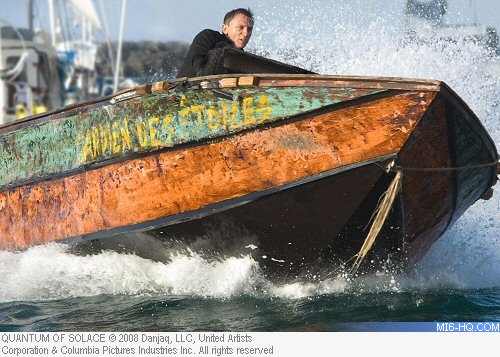 |
The Telegraph
Quantum of Solace, the follow-up to 2006's all-conquering Casino
Royale, begins with a bang. Lots of them, in fact. Edgy close-ups
of Daniel Craig's granite features give way to a spectacular
high-speed chase around an Italian coastal road. Bullets fly,
glass splinters, cars crunch, in a scene that - like many of
the film's best - owes much to the quick-fire editing of the
Bourne thrillers.
By the time the opening credits come along, playing out to Jack
White and Alicia Keys's punchy title song, you realise you've
barely breathed for five minutes. Thereafter, Craig's second
outing as the famous so-called "spy" -
actually, when you think about it, an assassin - turns out to
be a tale of revenge. And not for the first time in the franchise:
Timothy Dalton spent the whole of 1989's Licence to Kill in pursuit
of the man who murdered the wife of his CIA chum Felix Leiter.
For half an hour or so after the pre-credits "teaser",
the film barely lets up. An interrogation-gone-wrong leads to a
cracking foot-chase across Siena's rooftops - particularly "Bourne",
this one. And this, in turn, morphs into a brilliantly shot fight
on a
building-restoration
platform. Giddy stuff.
And then, the pacing becomes more fractured. One wonders if
director Marc Forster and screenwriters Paul Haggis and Neal
Purvis haven't tried a little too hard to distance the film from
traditional Bond plots. The expository dialogue scenes can be
dull, and cram in so many machinations and double-crossings that
it's easy to lose track of who's duping whom. And yet, several
times - just when you're tempted to consult your watch - the
movie suddenly surprises.
So, if Quantum of Solace lacks Casino Royale's narrative drive,
and is less than the sum of its parts, those parts are often
terrific. See it for them, and see it for Craig's fully-formed
Bond: angry, icily unsentimental, and fleetingly borderline psychotic
at the close. Craig inhabits the character with a ruthless charisma
that never lets up. And he, above all, keeps you watching.
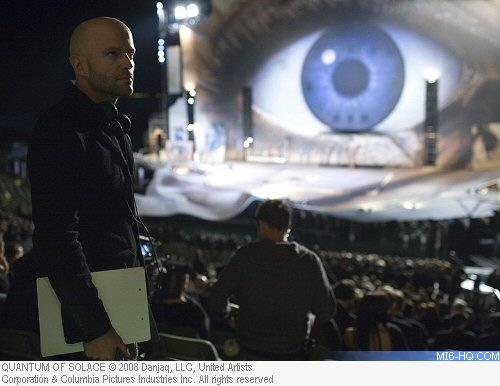 |
Total Film
Action - lots of it - almost too much in the first hour. Car-chase,
crowd chase, horserace, speedboat race, rooftop pursuit (yes,
like Hulk)... Best is a Bond-vs-henchman battle on collapsing
scaffolding which ends with both men swinging and dangling and...
if only... they could get... to their guns... There's also a
finale so fiery, you can feel the heat belting off the screen
(not literally) and a terrific set-piece at the Austrian opera-house,
where Bond shoots and slays his way out as Forster intercuts
with an on-stage death-scene. Arty, indeed.
Craig has grown into the role but Forster struggles to deliver
on the promise to get into his head and demystify him more. He's
the same as he was in Casino Royale - brash, brutal, dirty, nasty.
Craig clearly enjoys the bit where, icy blue eyes glinting, he
bludgeons a baddie and calmly holds his pulse, waiting for him
to definitely die. Brr.
The [Bourne] comparisons will still linger ("Bond is running
wild!")
and it's all shot, zippy, hand-held, Paul Greengrass-style. Forster
never seems comfortable with just keeping the camera still or
holding a shot. Maybe that's the fault of his relatively brief
edit-time, but the scene where Bond fights up close with a knife-swishing
assassin in a cluttered apartment: pure Bourne.
Best Bond Ever? Definitely not. The action is loud and proud,
but the story feels disjointed and muddled, with some uneven
flecks of comedy.,
Still, Craig's presence keeps the edges from fraying too far
and Forster just about nails the extra levels or artsiness and
melancholy.